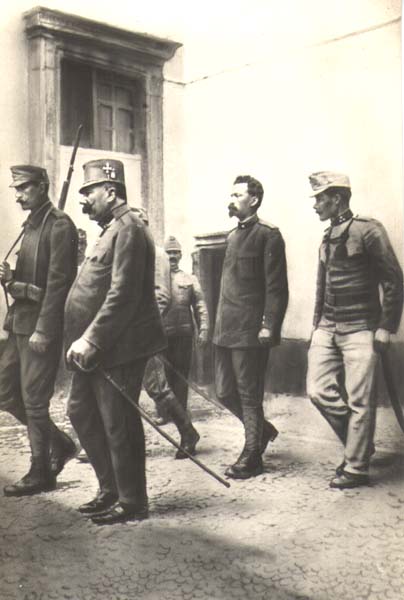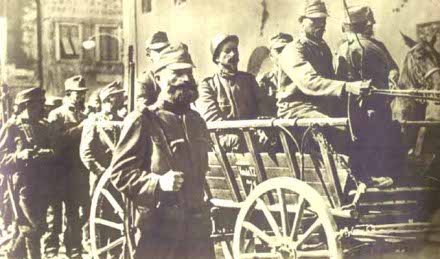On this date in 1916, the Austro-Hungarian empire executed Cesare Battisti and Fabio Filzi for treasonous Italian nationalism.
 It was the multiethnic Habsburg state that was itself dying of its constituents’ national aspirations; in little more than two years, the state entity that carried out this day’s sentences would no longer exist at all.
It was the multiethnic Habsburg state that was itself dying of its constituents’ national aspirations; in little more than two years, the state entity that carried out this day’s sentences would no longer exist at all.
Pre-World War I, Battisti (English Wikipedia entry | Italian) was actually a Socialist representative in the Austrian parliament.
When the unpleasantness broke out, though, he made a break for the peninsula where he agitated* (successfully) for Italian entry into the fray against Austria-Hungary. Irredentists had long coveted Habsburg properties with a heavy Italian population, like the Adriatic port of Trieste and Battisti’s own native Trento; the war offered an opportunity to swipe those territories, notwithstanding Italy’s putative prewar alliance with the Austrians.
Although already 40 years of age when Italy entered the war, the intrepid Battisti enlisted to fight. He was captured along with an otherwise obscure subaltern, Fabio Filzi, on the Alpine slope of Monte Corno (now known as Monte Corno Battisti) repelling the Austrian Strafexpedition.**
Austria did not stand on ceremony with these men; their capture took place on July 10, their trial on July 12, and their executions at the Castello del Buon Consiglio — an ironic Calvary, for a parliamentarian — later that same day. (To complete the scene, the strangulation-hanging was botched when Battisti’s first rope broke.)
The Austrian writer Karl Kraus would observe that “they thought they were hanging Italy, but it was really Austria on the gallows.”
Whichever one it was, they took a lot of pictures.


Battisti and Filzi as prisoners.

Battisti leaving the courtroom en route to his execution.

Battisti approaches the scaffold.

Battisti waiting at the scaffold as the sentence is read.




The Austrian army offers a prayer and salute to the shrouded body of Cesare Battisti.
* As a socialist who broke against the internationalist position and in favor of violent nationalism, Battisti was an ally of Benito Mussolini. It was Battisti, actually, who pioneered the socialist-nationalist-newspaperman act upon which Mussolini would later raise is own star, to such an extent that Battisti’s paper, Il Popolo — the apparent inspiration behind Mussolini’s own subsequent paper, Il Popolo d’Italia — gave the still-obscure future Duce some of his earliest gigs.
A martyr’s death during World War I fortuitously spares Battisti’s legacy the unpleasant association with his friend’s postwar turn towards fascism, so there are many streets and plazas named for Battisti, as well as a memorial in Trento. He’s also honored by name in the 1918 patriotic tune La Leggenda del Piave (lyrics).
** “Punitive expedition”.
On this day..
- 1822: Gullah Jack - 2020
- 1391: Amerigot Marcel, cast down - 2019
- 1758: Not Florence Hensey, Seven Years' War spy - 2018
- 2008: Two alleged prostitutes, by the Taliban - 2017
- 1995: Boris Dekanidze, the last in Lithuania - 2016
- 1936: Earl Gardner - 2015
- Themed Set: Meaghan Good (II) - 2015
- 2013: Zeng Chengjie, China's Bernie Madoff - 2014
- 1960: Manfred Smolka, East German border guard - 2013
- 1833: Frankie Silver, Morganton legend - 2012
- 2006: Rocky Barton, suicidal - 2011
- 1537: Robert Aske, for the Pilgrimage of Grace - 2009
- 1726: William Fly, unrepentant pirate - 2008
- Themed Set: Embarrassed Executioners - 2008





